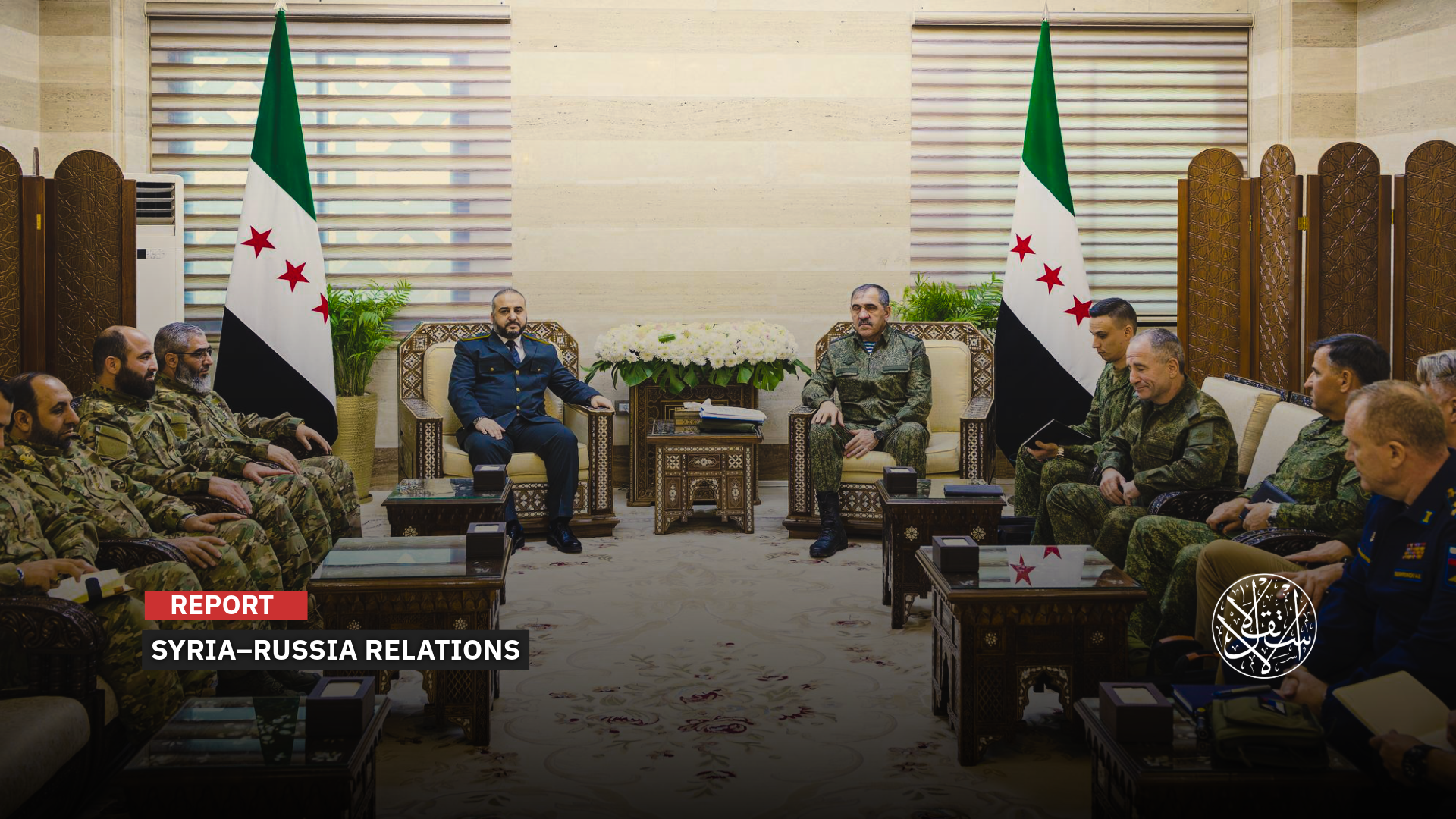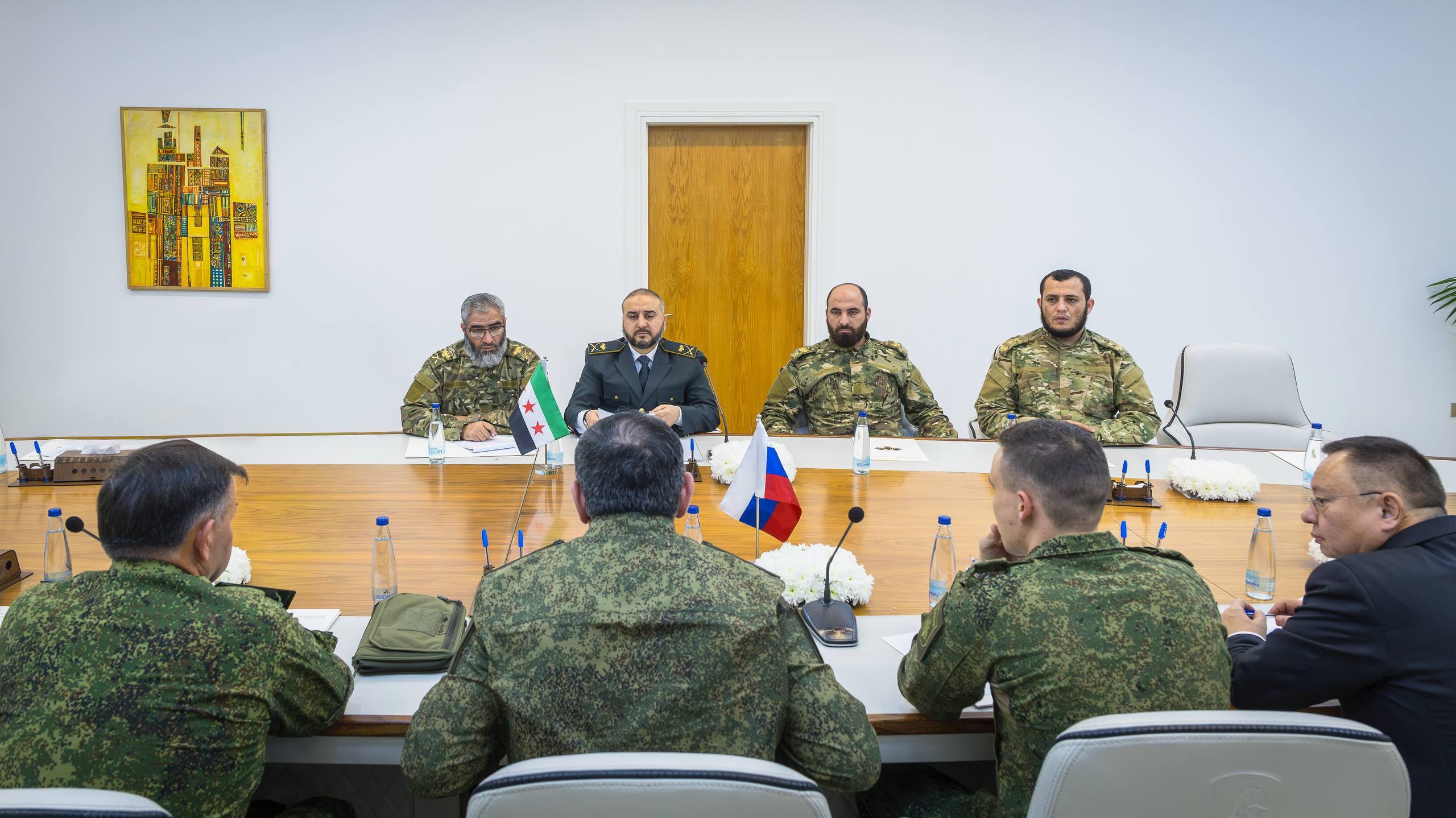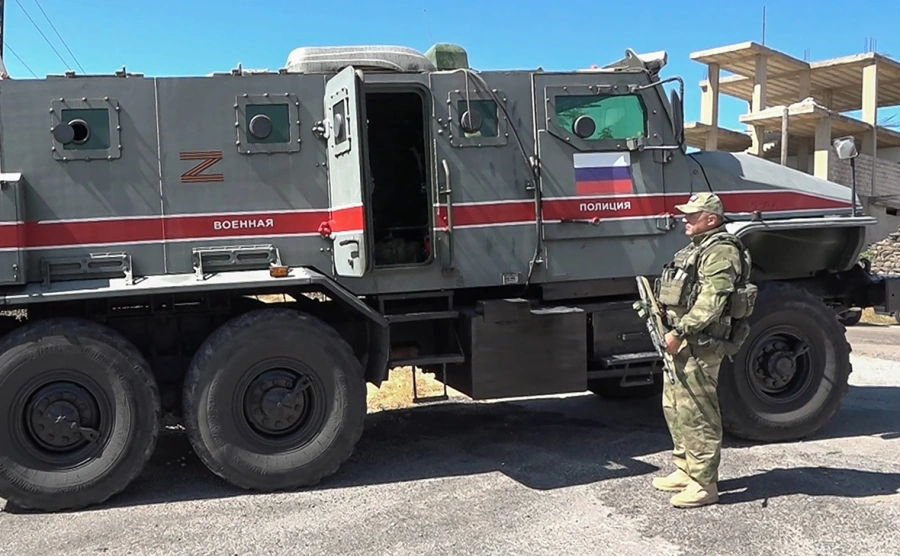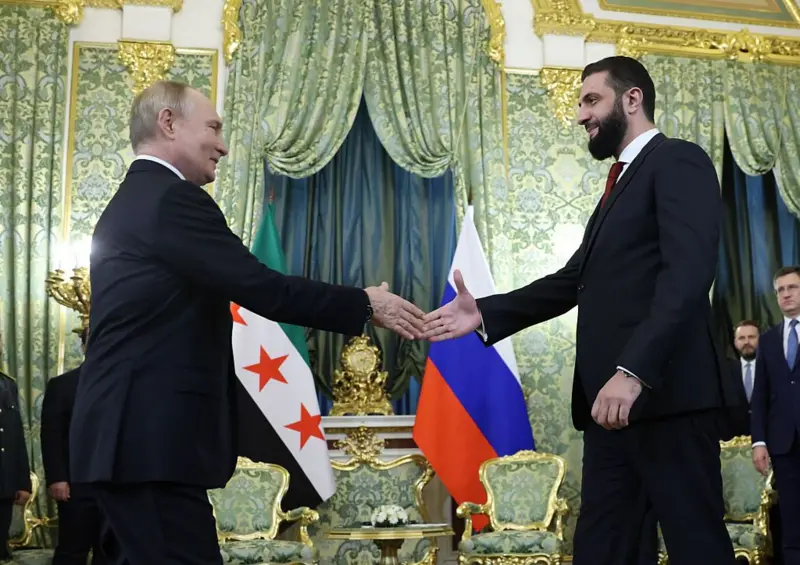Russian Troop Visit to Syria: Cementing Control or Preparing for a Post-Assad Phase?

Damascus wants to quickly redefine its relationship with Moscow.
Russia has signaled renewed efforts to reassert its influence in Syria following the military and political shifts after the ousting of Bashar al-Assad, Moscow’s former ally.
On November 16, 2025, Syrian Defense Minister Murhaf Abu Qasra received a high-level Russian military delegation in Damascus to discuss ways to strengthen military cooperation between the two sides, the Syrian Ministry of Defense announced.

Russian Delegation in Damascus
The Syrian Ministry of Defense announced through its official channels that Defense Minister Murhaf Abu Qasra received a delegation in Damascus headed by Russian Deputy Defense Minister Yunus‑Bek Yevkurov. The meeting focused on areas of military cooperation and strengthening coordination mechanisms to serve mutual interests and meet the aspirations of both countries.
This visit marks the first of its kind by representatives of the Russian Defense Ministry to Damascus since the ousting of Bashar al-Assad on December 8, 2024, and his subsequent flight to Russia, where he was granted humanitarian asylum along with his family.
Earlier, in late October 2025, Syrian Defense Minister Abu Qasra led a delegation on a three-day official visit to Moscow, where he met Russian Defense Minister Andrey Belousov to discuss strengthening bilateral defense ties, including training cooperation and other military areas.
In recent months, efforts have accelerated to open a new chapter in relations between Russia and the new Syrian leadership, moving beyond the era of Bashar al-Assad. This was exemplified by the historic meeting between Russian President Vladimir Putin and Syrian President Ahmed al-Sharaa at the Kremlin on October 15, 2025.
Observers note that the active engagement of Russian officials with the new Syrian authorities reflects Moscow’s desire to maintain its ties with Damascus, particularly regarding the preservation of its military bases, which the Russian Defense Ministry considers a strategic national interest.
On the other hand, analysts note that Syria also has a major interest in maintaining its cooperation with Russia during this sensitive phase of state restructuring and reconstruction, especially as Damascus seeks ties with actors capable of pressuring the Israeli Occupation, which, in their view, continues to destabilize the new Syria.
Experts also emphasize that Moscow has leverage over Tel Aviv, especially after “Israel” withdrew from the Agreement on Disengagement signed with Syria in 1974, the day after Assad’s fall. Since then, Israeli Occupation forces have carried out near-daily incursions into Syrian territory, along with airstrikes causing both human and material losses, while supporting separatist tendencies in southern Syria, particularly in the Druze-majority Sweida Governorate.
Some analysts suggest that deploying Russian peacekeeping forces in the Golan—a proposal Putin first made in 2013—could be a potential option for Damascus today to revive this role amid current Israeli violations, especially given Moscow’s favorable relations with Tel Aviv. Russian forces had previously established eight military points in the buffer zone along the border between the occupied Golan Heights and Quneitra Governorate, though these are currently inactive.
Notably, the Kremlin announced on November 15, 2025, that President Vladimir Putin discussed developments in the Middle East, including the situation in Syria, during a phone call with Israeli Prime Minister Benjamin Netanyahu.

Seeking Stronger Ties
Colonel Ahmed Hamadeh, a military and strategic analyst, told Al-Estiklal that the visit of a high-level Russian delegation to Damascus and its meeting with the Syrian Defense Minister underscores Moscow’s commitment to continuing cooperation with the new Syria.
“Russia places special emphasis on military collaboration, aiming to strengthen its presence at Syrian military bases and capitalize on Syria’s strategic position on the Mediterranean,” he said.
“This focus has grown especially in light of Moscow’s efforts to consolidate its international balance of power, which became more visible after the war in Ukraine.”
Damascus seeks to maintain a balance in its international relations while still relying on Russian military equipment at this stage. Moscow’s influence in key regional and strategic matters motivates Syria to keep active channels of communication open with Russia, according to the analyst.
Regarding the Russian delegation’s visit to southern Syria to assess conditions on the ground, particularly Israeli violations, Hamadeh suggested that this move could mark the beginning of a Russian mediation role or signal a potential reactivation of Russian military police previously stationed in the south before Assad’s fall, aimed at limiting Israeli incursions and attacks.
On November 16, 2025, villages along the frontlines near the ceasefire line in Quneitra Governorate were visited by the Russian delegation, accompanied by Syrian military police and public security forces. These areas have experienced repeated Israeli violations since Assad’s ouster, fueling expectations that Russia might resume a role similar to that it held in 2018.
The Israeli Broadcasting Corporation cited a military source stating that Moscow had proposed redeploying Russian military police patrols in southern Syria to act as a buffer between Israeli and Syrian forces.
Since Assad’s fall, President Ahmed al-Sharaa has repeatedly emphasized Damascus’s intention to recalibrate relations with Moscow. Ahead of his visit to the Russian capital, he affirmed that Syria seeks to manage calm and stable relations with Russia.
Experts note that Damascus appears to be accelerating efforts to redefine its relationship with Moscow after a decade in which Russia became a major player in Syrian decision-making, benefiting from the previous regime’s dependence on Moscow for support in suppressing the revolution.

Hybrid Strategy
Moscow appears to be reevaluating its military presence in Syria, as reflected in statements by Russian Foreign Minister Sergey Lavrov, who spoke about a new approach to redefining the roles of Russian forces and bases on Syrian soil.
In an interview with the RT’s Bridges to the East project on October 9, 2025, Lavrov noted that many Middle Eastern countries are interested in the continued presence of Russian forces in Syria, but the current phase requires reconsidering the functions of that military presence, including the Russian bases.
Lavrov explained that President Vladimir Putin has repeatedly emphasized that Moscow’s presence in Syria will not continue against the wishes of the Syrian leadership. He added, however, that Damascus, along with several regional capitals, is interested in maintaining that presence—albeit in new forms and for objectives unrelated to direct military support against armed opposition, as was the case previously.
Lavrov also mentioned a potential economic-humanitarian initiative: establishing a logistical hub for transporting goods from Russia and Gulf countries to Africa. He described the project as serving the mutual interests of Moscow, Damascus, and several regional capitals.
Observers note that Russia’s renewed approach may also be an attempt to consolidate its influence in Syria, particularly amid improving U.S.–Syrian relations, highlighted by President Ahmed al-Sharaa’s meeting with U.S. President Donald Trump at the White House on November 10, 2025.
This diplomatic opening led Washington, on November 13, 2025, to officially announce Syria’s accession as the 90th member of the international coalition against ISIS—a strategic shift reshaping Damascus’s regional and international alliances.
In parallel, the Kremlin sent one of its top military officials, Yunus Bek Yevkurov, to Damascus as Moscow’s “new instrument” for handling sensitive matters in Syria. According to Syrian researcher Diaa Qaddour, Putin dispatched “his most trusted military men,” describing Yevkurov as Russia’s “armed diplomat” due to his hybrid approach combining military and economic dimensions, backed by extensive field experience and advanced negotiation skills.
Following Assad’s fall, experts see the resumption of Russia’s traditional supplies of weapons, fuel, and wheat as a lifeline for Syria, a country of 23 million people, 80 percent of whom live in poverty.
Some analysts also argue that setting aside hostilities benefits both countries. Syria, now in the process of state-building and economic recovery, needs positive relations with permanent members of the UN Security Council, including Russia.
This was evident when Russia did not object to the Security Council’s vote to lift sanctions on President Ahmed al-Sharaa on November 6, 2025, while China abstained from voting.
Researcher Diaa Qaddour noted that Yevkurov is seen as a conflict stabilizer, given his previous role in containing ethnic tensions in the Caucasus, which has a positive impact on the situation in Syria.
“Yevkurov is considered the successor to the former Wagner Group commander, signaling that Moscow is no longer relying primarily on its Hmeimim base to influence Syria but is seeking to cement its presence there as a bridge toward Africa,” he added.
Sources
- Syrian Defense Minister Hosts Russian Delegation in Damascus to Boost Military Cooperation [Arabic]
- Russian Delegation Tours Quneitra Villages Amid Signs of New Security Arrangements [Arabic]
- Russia’s Foreign Ministry Denies Confirmation of Russian, U.S., and Turkish Delegations Arriving in Damascus for Talks [Russian]
- Outcomes of the Historic Meeting Between al-Sharaa and Trump at the White House [Arabic]
- From the Battlefield to the Kremlin: al-Sharaa Meets Putin, Sparking Controversy [Arabic]









